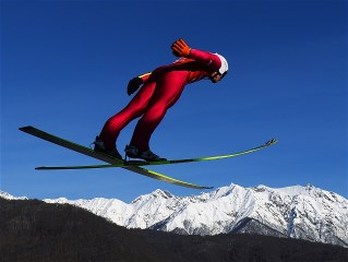Some of the problem might be because there are only certain parts of the country where one can participate in and enjoy winter sports. America is a big place, and a lot of people have never been to a snow-capped mountain, let alone tried luge.
The sports at the Summer Olympics are more appealing to the masses because the likelihood of the masses having participated in those sports, in some form, is great.
Most people have competed in a foot race in their lifetime. Many have practiced dives at community or backyard pools. We often join basketball and soccer teams or take gymnastics and martial arts at an early age.
Whether it’s a lack of interest or a lack of resources, a lot people have never tried winter sports, and that makes it difficult to muster up enthusiasm for the Winter Games.
Lack of Knowledge About Winter Sports
Unless you have some knowledge or experience with the sport, watching many of the events in the Winter Olympics is like watching a foreign film without subtitles.
There are many winter sports that have rules or judging that anybody, regardless of education or experience level, can understand. With some of the events it’s easy to tell who the winner is.
Who got down the mountain the fastest? Who jumped the farthest? Who scored the most points? Who got closest to the target?
There are other events at the Winter Games, however, where the rules, lingo, and scoring are so foreign that it’s hard to get engaged in the competition because you really don’t know what’s going on.
To be fair, some of the events in the Summer Games have the same issue. Sports like gymnastics, diving, and race walking are the jargon-laden, foreign, and awkward equivalent to figure skating, snowboarding, and curling, yet we are still more likely to watch even the most boring of events at the Summer Games over those offered in the Winter Olympics
We’re Hibernating
Another problem with viewer enthusiasm for the Winter Olympics revolves around the season more than the lackluster and specialized sports.
In the summer time, we are more active. The days are longer. We’re soaking up the Vitamin D, and we typically have more energy. The same can’t be said in the winter.
Winter is grey. Winter is cold. We hibernate in winter. Our energy is low. Our heart rate drops to a crawl as we shovel heavy, hearty, stomach-warming meals down our throats with no thought to our bulging body parts because we’re wearing cozy, comfy sweat pants.
Then we crash on our couches or lounge in our recliners and turn the TV on to watch the Winter Olympics.
The flurries and blur of whites and greys are a lullaby as the skiers race down the mountain and commentators recap the bios and technical achievements or shortcomings of athletes we’ve never heard of.
Our eyes droop as ski jumper after ski jumper and snowboarder after snowboarder takes their turn, the attempts blending together like they’re on a video set to loop. Was that a good trick jump? I don’t know. It looked just like the other two before it, to me.
Head to Toe Coverage
Take the monotonous backdrop of isolated places in the mountains or man-made ice shoots and add in figures dressed in full body suits; thick, tinted goggles; aerodynamic helmets; snow boots and bulky mittens, and we don’t know if we’re watching a person or a Power Ranger.
I never had a favorite Power Ranger because I couldn’t see their faces. My favorite color is orange, but that wasn’t an option, so therefore I never got into that show.
Polar Opposite
There are some sports in the Winter Olympics where you could pick the athletes out of a line-up, if need be. Figure skating is one of the few sports where you can actually see the athlete’s full face and body.
The costumes in figure skating are so eccentric it’s like Liberace designed the sport. Don’t get me wrong, figure skating is a difficult sport and figure skaters have mad skills, but how can you expect me to pick out the difference in a triple Salchow and a triple Lutz when the skater’s wearing a skin-tight bedazzled jump suit with lace fringe on the end of their sleeves?
I’d give one and a half toe loops if someone would wear something normal and weather appropriate on the ice. As it stands now, they’re all a bunch of Vampire Lestats.
The Olympic Spirit Flickers
There are times in the Winter Olympics when we get engaged. When a bobsledder or luger crashes, that’s exciting.
When figure skaters bite the dust, we like that. When it’s partners and one drops the other, even better.
When skiers plummet and snowboarders face plant, we’ll watch the replay and maybe stick around awhile longer. If the crash is bad enough we’ll watch the next couple of competitors to see if they suffer the same fate.
The likelihood of competitors crashing are far better in the Winter Games than in the Summer Games, but it’s not enough to keep us tuned in for the long haul. Besides, you don’t have to watch the games to see crashes. If it’s bad enough it will be on YouTube.
Sounds of Silence
It seems like there’s a lot more cheering in the Summer Games simply because of the nature and venues required for the sports. Many sports in the Winter Games start in parts of a mountain so far removed from civilization that if a skier fell no one would be around to hear it.
Sure there’s cheering at the end near the finish line, but along the way, there’s nothing but the whip of the wind, the crush of snow, the flap of flags, and commentators swapping out uninteresting natural sounds with useless information.
Speed skating and hockey are exciting and filled with cheer, but bobsleigh, skeleton, and luge have a rhythmic rocking as the sleighs navigate turn after turn.
The same can be said for ski jump. You’ve got the starting beeps, the scrape of the skis sliding down the ramp, and then comes the wind for what feels like ten minutes before you finally hear the spectators’ cheers.
Although figure skating is one of the more popular events in the Winter Olympics, the music played during those routines is so boring it could be marketed as a sleep aid.
U.S. Isn’t the Best
Americans have pride. There are many who have never stepped foot outside of this country who claim it is the greatest country on earth, but even the least-traveled American citizen knows that on an international level, the U.S. sucks at winter sports.
Who wants to watch our team come in 9th behind athletes whose names have only a handful of vowels? Did you see who won Nordic Combined? No, but I wonder when the Jamaican bobsled team will race. I always did like John Candy.
Though our prowess is waning in the Summer Olympics we still dominate many events, which is good for our egos. With the winter games, however, we’ve never carried a big weapon. Sure we’ve got our all-stars in a few events, but as a whole, Americans just don’t perform well in more hazardous weather conditions.
Why Watch
As boring as they are, there are a handful of reasons you should watch the Winter Olympics.
Danger Zone
The most important reason to watch the Winter Olympics, in my opinion, is that nearly every athlete who competes risks killing themselves.
Sure there are some dangerous sports in the Summer Olympics, but not like there are in the Winter Games.
Take skiing, for example. Skiers are racing down a treacherous mountain with nothing to protect them but a spandex body suit, two poles, a helmet, and a fresh coat of Chapstick.
Figure skaters are even less protected. They twirl around on thin metal plates with nothing but a pair of panty hose and a ponytail holder to protect them, and then we get pissed when they don’t do back flips in their routines.
In bobsleigh, skeleton, and luge, those people are like bullets inside the barrel of a very long, icy shotgun.
Ski jumpers? They just fly into the abyss and hope to land safely on the long pieces of wood that are strapped to their feet.
Sure not every sport in the Winter Olympics is dangerous. I don’t see any real threat to curlers other than tennis elbow. I’m also not trying to downplay the safety concerns associated with the Summer Olympics.
All sports have a level of danger to them. For example, divers can easily smack their heads on the board if they’re not careful, but at least with divers, they have a shot at landing in the water afterwards. For winter sport athletes, if they smack their head, they almost always land on ice.
Any athlete willing to risk their lives to claim gold for our country deserves our attention, even if it is only until the next commercial break.
Games That Pays In Laughter
Another reason to watch the Winter Olympics is to make fun of the commentators. They say some of the funniest things.
To their credit, it’s hard to commentate something as technical and boring as say the biathlon, but when it comes to creating excitement about something that isn’t in the least bit exciting, no one does it better than Winter Olympic sports commentators.
If you listen to what they’re actually saying, you might just find the catch phrases and nuances of their broadcasts funny enough to be worth your time.
Oddity
The Winter Olympics, like the Summer Games, only come around every four years. Add in that we rarely get to see sports like slalom, skeleton, and curling, and it’s safe to say the Winter Olympics do provide a rare opportunity to experience something new. There’s no reason not to try to watch at least some events at this year’s Winter Olympics, if for anything than to say you saw something you don't see every day.
Something for Everyone
Though the Winter Olympics might not shine as bright in America’s heart as the Summer Games, there’s no reason why viewers at home can’t find some sort of joy in the festivities.
Whether it’s cheering for athletes as they cheat death, poking fun at the excited and nerdy commentator banter, seeing a sport you will never in your life play, or simply watching because there’s nothing else on, everyone can find something entertaining about the Winter Olympics.
Last-Ditch Effort
If none of that piques your interest, there’s still one more reason you should watch the Winter Olympics. There’s no other sport on TV, outside of maybe golf, billiards, and car racing that can make you fall asleep faster than winter sports like cross-country skiing and curling. It’s better than Ambien, and if there’s one thing America needs, it’s a good night’s sleep.
You can enjoy the Winter Olympics in Sochi, Russia from now until the torch is extinguished Feb. 23.
Story by: Charlie Hustle







